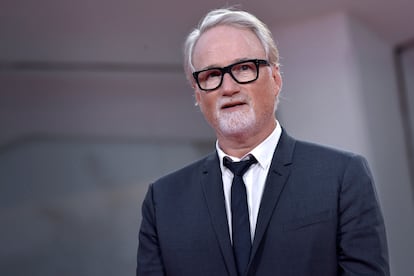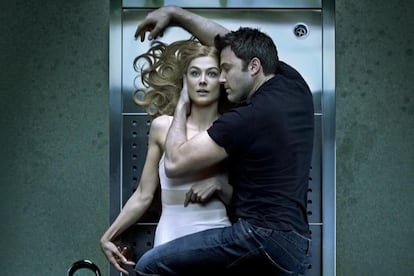David Fincher: ‘Directors are trained dogs who like to do a backflip and be applauded afterwards’
The man who directed films such as ‘Seven’ and ‘Zodiac’ has released his latest film: ‘The Killer.’ In an interview with EL PAÍS, he reflects on his cinematographic technique, his fascination with criminal minds, his terrible experience directing ‘Alien 3′ and his reputation for being tough on set

In front of David Fincher, there’s a table and a glass of water. The typical, minimal decoration of any interview. But the talent of the 61-year-old director isn’t typical or minimal at all. With just a few bursts of words, he can transform a nondescript setting into a sudden master class in cinema.
He’s always thinking about how something could be filmed, from where, with what intention. His long shots — assembled with frenetic phrases — are capable of turning even the dullest premise into a thriller.
The Denver-born director has a career that spans three decades, with iconic films such as Seven (1995), The Social Network (2010) and Gone Girl (2014). He’s one of the most-admired filmmakers on the planet, for his visual style, his extensive research into the abysses of the mind and his capacity for immersive narration.
Fincher is a relentless perfectionist, just like the protagonist of The Killer, his latest film, now playing in theaters and available on Netflix on November 10. The professional assassin has a perfect record… until, for the first time, he makes a mistake.
In Fincher’s career, there are hardly any. Except, perhaps, right at the beginning. He was 30-years-old and had a solid reputation as a director of music videos, when he was offered something on the big screen. From the vertigo of recording Madonna or Michael Jackson, he was suddenly part of something even more terrifying: Alien 3. But he wasn’t scared of the creature, he was simply horrified by the industry, its thirst for money, its managers, its obstacles to creativity. To this day, he says that no one hates that film more than him. “I was like, ‘Well, surely you don’t want to have the Twentieth Century Fox logo over a shitty movie.’ And they were like, ‘Well, as long as it opens.’ He added that the experience made him “a belligerent bastard.”
Another key to his fame is his impeccable workmanship. He’s always hunting for details, seeking the perfect final result. Some say he goes overboard. Gyllenhaal — who starred in Zodiac (2007) claims that Fincher “paints with people” while working. “It’s tough to be a color,” the actor added, in an interview with The New York Times. “It’s hard to be David Fincher,” Jodie Foster once said.
The director confessed, in a chat with Sam Mendes, that the phrase he repeats most on set is “shut the fuck up, please.” He admits that he becomes firm when he notices that someone is slacking. He believes it’s necessary, given the time and the money at stake. The viewer also isn’t allowed to relax.
Years ago, he was in talks to direct an installment of Spiderman, but what he proposed must have been so different that the executives despised it. With Fincher, it’s all love or hate.
The premiere of Fight Club (1999) — at the Venice Film Festival — awakened, above all, the latter sentiment. “They wanted to tear off our skin,” the creator said some time later. However, when he returned two months ago to the festival — where this interview was held — the event organizers welcomed him like a divo.

Question. How did you decide to dedicate yourself to cinema?
Answer. As a child, I conceived of it as something that happened in real-time. When I was seven-years-old, my favorite movie was Butch Cassidy and the Sundance Kid [1969]. And, in my head, it would have taken about three weeks to make. Then, I saw a documentary about it… and suddenly, they were filming [the movie] in Utah in the spring and in Wyoming in the winter. Behind the scenes, everything that happens [off-screen], all the time it takes. I thought, “Wait, you [get to ride on] a bunch of trains, blow up firecrackers next to some fucking horses and spend time with Katharine Ross?” It’s the best job in the world.
Q. Your debut with Alien 3, however, was “a nightmare,” in your words.
A. Well, what came out of it wasn’t a nightmare. And that’s what keeps pushing you. It’s like doing magic for children. There’s an immediate satisfaction you get from that. As much as the directors’ union tries to make what we do sound like high art, in the end, we’re all ostenstibly trained dogs. We like to do a backflip and have everyone clap afterwards.
Q. Do you like being on the set?
A. I hate it. From the moment you wake up until you collapse, hourglass sand is falling down and every moment someone appears with a “what if?” And you think: “Fuck, I don’t have time for that.” But you’ve got to make time for the “what ifs?” if you want to experiment and be open to inspiration. But you still have to execute your damn plan and use a language [that indicates] where you need to place the camera so that the actors don’t really notice. So, it’s all about how you parse your time and how you support your assets each day, which makes it semi-militaristic. And yet, what you’re trying to do with everything is more akin to poetry than it is to architecture.

Q. How much do you have to fight to maintain your vision of a film?
A. Obviously, you have to fight. It’s highly technical to even just record someone walking and picking up a glass of water. That alone implies that a decision needs to be made: do we track the person? Do we take a panoramic view and see the person in the mirror? But then the camera would be seen, so we have to move that piece of furniture. And so, you start to subdivide it and these are questions you need to ask yourself.
There’s a recurring colloquial understanding about the European way of making films and the Hollywood way. In Europe, you focus on two people talking: they may walk towards you for a while, or turn around, or walk away. And it’s perfectly acceptable. But it wasn’t acceptable in the 1940s if you had cast a Cary Grant and you were paying him a million fucking dollars. [People want to see the actors’] faces… it’s a mandate that came down from above. But the Europeans say: “We already know who the guy is, he was on the poster and that’s why we bought the ticket. We don’t need to see him all the time.” So there’s always this ballet between what you see and what you don’t see. How do you distribute the information?
In the end, directing is very simple: it’s about what the audience sees, when and how they see it, if it reflects or contradicts the plots. And all of this is just the mechanics — the poetry isn’t there yet. Now, you bring in the actress, and she decides to infuse something into it, and it’s great, it seems kind of sad. And you say: “I would also like a chill [in the room], or maybe some anger… and how about a shot where you don’t feel anything?” And they’re all legitimate avenues. And you’re not sure until you put it all together.
Q. And this is how you became famous. And how you got your record of 107 takes…
A. I’m so tired of that story, of having to explain it to lazy thinkers who are totally determined to turn it into a dictatorial imposition. I don’t impose anything. There are people who don’t like to do a lot of takes. I understand that. Brian Cox, for example. The scene can be great, but sometimes it can be better on take 12 compared to take three. And I want to shoot them because I want to be able to choose.
Q. There’s a lot of talk about art and poetry in this field. But how important is money in cinema?
A. It’s everything, because it’s equivalent to time. If someone likes the script and gives you $5 million to do it, everything has an equivalence in numbers. The quality and experience of the actors, the director, the scriptwriters, the operators. The people who are best-known for their technique make a valuable contribution, but they increase the costs of a production. Putting professionals together for a movie is like putting together an NBA team. You’re constantly adjusting the alchemy.
I think the biggest disservice ever done to cinematic storytelling came from the families who started the studios in Hollywood: the notion that you could take what Henry Ford had done to build a Model T and apply it to stories. That’s not how it is. Each production works differently. There are directors who don’t want the crew to come in until a very intimate argument between two actors has been completed, while others want 80 people watching, because then the actors will be more attentive. It’s alchemy. Sometimes, it’s magic. Other times, it’s psychology. Or just good timing and human management. And all of that can exist simultaneously.
Q. In an interview, you gave the reasons that make you want to see a film by Sam Mendes or Steven Soderbergh. Why should people go see your movies?
A. I don’t get jealous. [Mendes and Soderbergh] are thinking three-dimensionally, they’re not just trying to make something acceptable: how do I give it a spin, how do I get something else out of this?
There are certain people who want us to tell them a story and don’t know who the director is or who wrote the script. Many people go to the cinema without even knowing what the movie’s about. But deep down, I want the same thing from a movie as someone who knows nothing about film. Maybe they just aren’t able to articulate it.
A friend once asked me what I think constitutes great directing. It’s simple: I want to be taken somewhere, without realizing it.

Q. Why are you so fascinated by murderers and their minds?
A. Ask Hitchcock. I like drama and have always been interested — even before watching Rear Window [1954] — in the cul-de-sac down the street. I remember, as a child, coming home at 7 or 8 p.m. No one has drawn the blinds yet, the sun is gone. You’re in the dark, walking near the trees… and the lights come on and it seems like a movie. All this life that moves and you just look at it and think.
I especially like it when there’s a question to be answered. For example, you hear someone shouting. Then, there’s a guy having a smoke. Now he has a briefcase… I’ve always been interested in the idea of sinister deduction. And it happens in Zodiac or in Seven, which I consider to be a misunderstood horror film. Because Seven seems like a thriller at first… but when Kevin [Spacey] turns himself in, you realize that you’ve focused on the wrong thing and now you’re in a third act that’s totally different from what you expected.
Q. The certainties of the protagonist in The Killer collapse after a single mistake. Has anything like that ever happened to you?
A. My mistakes are much bigger. If you don’t have regrets, you haven’t lived.
Sign up for our weekly newsletter to get more English-language news coverage from EL PAÍS USA Edition
Tu suscripción se está usando en otro dispositivo
¿Quieres añadir otro usuario a tu suscripción?
Si continúas leyendo en este dispositivo, no se podrá leer en el otro.
FlechaTu suscripción se está usando en otro dispositivo y solo puedes acceder a EL PAÍS desde un dispositivo a la vez.
Si quieres compartir tu cuenta, cambia tu suscripción a la modalidad Premium, así podrás añadir otro usuario. Cada uno accederá con su propia cuenta de email, lo que os permitirá personalizar vuestra experiencia en EL PAÍS.
¿Tienes una suscripción de empresa? Accede aquí para contratar más cuentas.
En el caso de no saber quién está usando tu cuenta, te recomendamos cambiar tu contraseña aquí.
Si decides continuar compartiendo tu cuenta, este mensaje se mostrará en tu dispositivo y en el de la otra persona que está usando tu cuenta de forma indefinida, afectando a tu experiencia de lectura. Puedes consultar aquí los términos y condiciones de la suscripción digital.









































